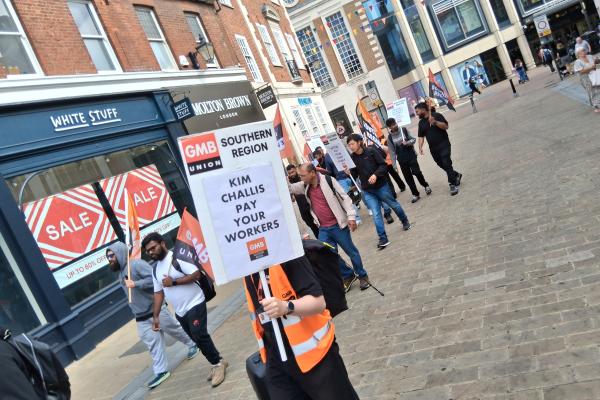“Kingston council, shame, shame.” “APCOA, shame, shame.”

Before the picket, I interviewed one GMB staff member and two striking workers, including the acting representative. The GMB worker I spoke to was Alex Etches, the Regional Organiser. Alex told me that the Kingston parking wardens, who call themselves civil enforcement officers or CEOs, were striking for fair pay and recognition of the union, and that they have been fighting for these things since last year, but APCOA have been denying them the right to bargain. Currently, the traffic wardens are on the London liveable wage, £13.85 per hour, far below the workers in Camden and Westminster, both of which earn £16.50. The aim of the striking workers is to have a pay rise to £15 per hour, which would still be significantly less than others doing exactly the same job in the same city. APCOA have not signed a recognition deal or made any offers, but will be sitting down for a discussion around pay and conditions. Alex said that the picket’s job was to remind the council that outsourcing workers didn’t mean they had no responsibility to them, and to attempt the end of the illegal transfer of agency workers to replace the strikers. He also stated that the treatment of the ‘majority migrant workforce’ was a ‘disgrace’.
I then spoke to Lennon, who has been elected as the union representative in spite of APCOA’s lack of recognition. Like Alex, Lennon said that the workers were striking for a pay rise, due to the workers in Kingston being paid far less than workers in other boroughs. Lennon said that living on his current wages was difficult due to inflation. The workers are surviving on this wage, and are expecting the pay to increase by £2, which he felt would be ‘much better’. He also claimed that the workers were united and would remain so, as they were determined to push harder and force a pay increase, and that striking and sticking together feels good.
Finally, I spoke to an anonymous worker who attended the strike about how the current wage was impacting his life. He began with the topic of transport, explaining that the cost had recently risen by £1, and that their pay had only increased by 70p. The workers were now having to pay around £130 per month for transport. Alongside this, water and electricity bills are also rising. Despite working hard for four years, he never saw a pay increase of over 70p. He also said that multiple of his colleagues were married and had children to provide for. If a pay rise was gained, he said he would be able to spend more time with his family and bring them better food. Additionally, some of the workers arrived in the country recently, so they have to pay for healthcare and schooling- the worker said that life for them on the current wage is ‘Hell’. He then said that APCOA were spending the majority of the money that the council gave them on internet for the offices, despite the officers only being there on their break, meaning the wardens’ money effectively only benefits office workers. The worker said that this was unacceptable and called for them to be paid what they deserved. He affirmed that he understood corporate jobs were also hard, but that the wardens were working outside all day in all weather conditions.
Shortly after the interviews, GMB and the striking workers began their march through the city centre towards the council, leading chants including “Kingston council, shame, shame.” “APCOA, shame, shame.” “What do we want? Pay rise! When do we want it? Right now!” The parade held GMB Southern Region flags and placards with messages such as ‘Traffic wardens on strike for fair pay’. Another placard called for Kim Challis, APCOA’s Regional Managing Director for the UK and Ireland, to pay her workers. As the picketers walked, multiple members of the public showed support for the group. When they reached the council building, they were told by a security officer to stay behind a barrier, keeping them off council property. At this time, a graduation ceremony was taking place on the property. Security seemed to attempt to use this as a means to discourage the union and striking workers from their action, but this was unsuccessful. The union staff congratulated the graduates, leading the parade into two rounds of applause. The graduates were undisturbed by the picket, and the two groups left each other alone. After a while, Alex and Lennon entered the building to attempt to talk to Matthew Essex, the Executive Director of Place, who claimed he was too busy to speak to them. After this, the picket departed with a promise to return the next day.
Aurora
Work Experience Student



